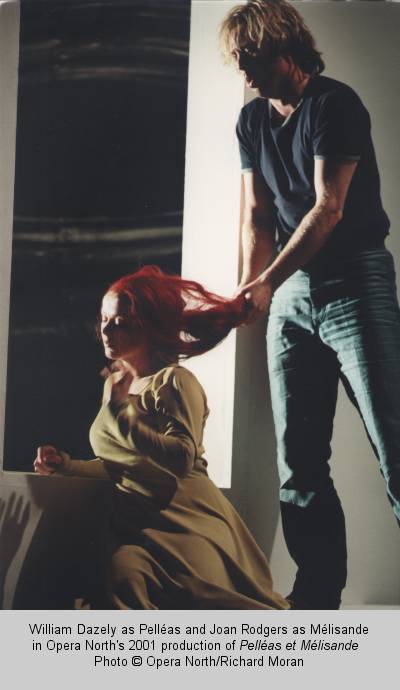|

4. The tragic dimension.
Debussy's 'Pelléas et Mélisande' as in
Opera North's current production
For Wagner the identification, in Tristan und Isolde, of love
and death amounted to an apotheosis of humanism, for although Tristan, like
all of us, has to die, he dies in the belief that his consuming passion
is the universe. More commonly the fin de siècle Death of
Europe implied a pessimistic view of human destiny, as is evident in the
elegy of Delius's A Village Romeo and Juliet, and in Maeterlinck's
play Pelléas et Mélisande which Debussy, between 1894
and 1902, respectfully musicked. But whereas in Wagner's work the inner
life takes over, in Debussy's work retreat within the psyche becomes an
ultimate submission; his characters are lost, will-less, in Milton's 'blind
mazes of this tangled wood', and to accept this submission is the only wisdom
we can hope for. It doesn't matter that in Debussy's world God as creator
and preserver is absent or inoperative, for instead of God, there are only
feelings, sensations, and whatever causes sensations. Accepting the flux,
human consciousness becomes existence without duration. There are no causes
or consequences, only present moments, though some of them are memories
of the past.

Yet since Debussy seeks liberation from both past and future,
Pelléas et Mélisande takes place in a timeless antiquity
that is also an eternal present, and in a selva oscura that is also
the pre- or sub-conscious mind. None of the characters 'stands for' Debussy
(or Maeterlinck); and Golaud, the only protagonist to attempt, albeit unsuccessfully,
to take action about anything, is the villain, albeit a sympathetic one
since he is part of us. For the young lovers, Pelléas and Mélisande,
the only 'happiness' is acquiescence in their destiny -- what happens to
them; and acquiescence becomes identified with inanition. This is why the
opera is that rare phenomenon, a truly revolutionary work of art.
Continue >>
Copyright © 20 January 2001
Wilfrid Mellers, York, UK
 << Music
& Vision home Recent reviews
Alfred Schnittke >>
<< Music
& Vision home Recent reviews
Alfred Schnittke >>
|

